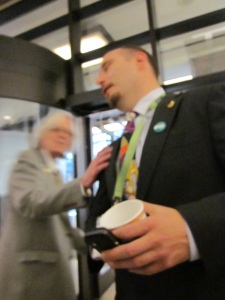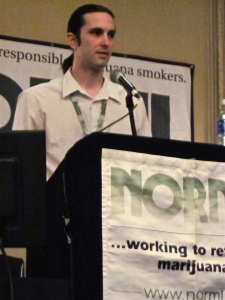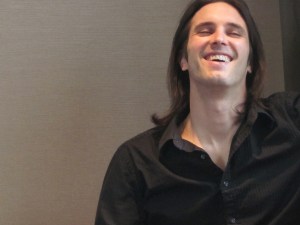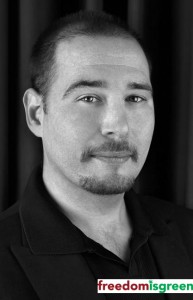“Miss, either take off your sweatshirt or that woman right there will pat you down.”
“I’d prefer the patdown please.” Heck, someone wants to lay their pretty little hands on me, even at airport security, who am I to stop them? Pat away, baby.
I walk through the scanners and this attractive woman slowly begins frisking me in what I deem a sensual manner. I found myself slightly hypnotized by her firm but yielding touch. Reflections of the The National Organization for the Reform of Marijuana Laws (NORML) conference I just attended begin floating through my mind.
Let’s get something straight: I’m not a huge medical marijuana activist (though I believe it should be legal). I’m more of a jaded bon vivant who observes life in her own special way. So when I was invited to this conference, I wondered what I could contribute, if anything. So instead of telling you about medical marijuana or the laws and science surrounding it and the pioneers behind it, I figured I’d just share my peripheral views, on the event and Denver itself.
So with no further ado:
1. Denver is brighter than other places:
I guess because it’s closer to the sun, but the place is bathed in this crystalline white light. People seemed friendlier here as well, though this may be the weed.
2. The Grand Hyatt is very hip.
The staff dedicated a whole floor to medical pot smokers, with these sweet letters left on our doors encouraging us to smoke as we see fit. Well, hello progressiveness. Stop by New Jersey when you get a chance.
3. People know far too much about weed. Crazy words were being bandied about: cannabinoids, phytocannabinoids, tetrahydrocannabivarin, etc. I can’t even roll a joint let alone dissect the damn thing.
(Don’t look at this chart below. Your eyes may bleed.)
4. Montel Williams is one slick cat. He served as the moderator for the mayoral debate held during the conference. Man, this guy is poised. He probably smells really good too.
5. Maximize your hotel room. I for one love the freedom of a hotel room. You can take scandalous photos of yourself. Then take a nap. Or no….go to the hot tub on the roof, then nap. Then take a bath. Then drink wine. Then take more scandalous photos of yourself. I call it vacation.
6. It’s hard to get a photo of Chris Goldstein standing still. Chris is one of key organizers of the event and a good friend of mine. This man is on the go. It’s a good thing he doesn’t have a cocaine addiction or he’d blow us all up.
7. Denver has good beer and coffee. Damn good. It must be the mountain water. Below, my friend Diane devilishly imbibes.
8. 4:20 on 4/20 is a mixed bag. Thousands of people gather in front of the city’s town hall and smoke out during this special time frame. I expected it to be an inspiring event but instead it seemed seedy and depressing. Pot is a tricky drug – it has the ability to really help people on so many levels, but it can still be abused.
9. Hippies can be bad asses too. A group of conference attendees went out to dinner one evening and these rude guys sat next to us and began playing their iPod at the table. (Really? Do we not know that’s rude?) Worse, they were playing some generic brand dance music from the 90′s or something equally ear-raking. I asked them (very politely, with teeth clenched) to turn it off.
Well, they didn’t appreciate my request. An argument ensued. I was ready to throw down (I’m from Jersey. It’s what I do!) Nobody at our table really saw how heated this was getting except for this guy, Brian Wallace of MAPS, who finally diffused the whole thing in a friendly but slightly fierce manner.
10. Science nerds can be turned into models. Cannabinoid researcher Jahan Marcu is a brilliant guy. Almost a little too brilliant. I decided to dumb him down a bit by having him pose for a few GQ style shots. As a media gal, I realize the importance of people like Jahan – they add a young, fresh face to the movement, which is always a good thing.
Before:
After:
11. The piano player at the Grand Hyatt in Denver is amazing! His name is Mark Pressey. He even let me sing “Someone to Watch over Me” with him my last night there. I love you, Mark!
12. Being in the presence of Ziggy Marley is just plain special.
I didn’t really think I’d be as moved as I was by hearing him perform. There’s this energy the Marleys possess; warm and inviting, like sunshine. I guess that’s no surprise.
13. Many people secretly like John Denver. “Rocky Mountain High” played through my mind the second we touched ground in Denver. The more I talked about him with others, the more I realized that many people are closet fans. Shh…
“Miss, you’re good to go” whispers the pretty security lady after our special encounter together. I tried to light a cigarette but it was forbidden. (But so is our love, isn’t it?)
“Are you sure you’re done? Wanna check again? There are….other places,” I ask. Wink, wink.
She smiled demurely and I boarded my plane back to Philadelphia.
 Beth Mann is a popular blogger and writer for Open Salon and Salon. She is also an accomplished actor and director with over 15 years of experience, as well as the president of Hot Buttered Media. She currently resides at the Jersey shore where she can often be seen surfing or singing karaoke at a local dive bar.
Beth Mann is a popular blogger and writer for Open Salon and Salon. She is also an accomplished actor and director with over 15 years of experience, as well as the president of Hot Buttered Media. She currently resides at the Jersey shore where she can often be seen surfing or singing karaoke at a local dive bar.
Contact: maryjane {at } freedomisgreen.com

















